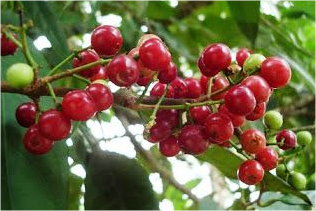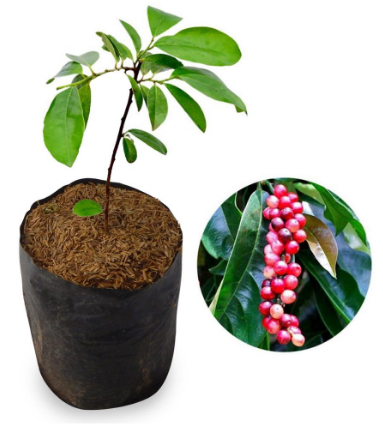Buni fruit began to be rare - It tastes sweet, sour, and tends to be tart flavor, making this red-purple fruit suitable as a complement salad. Buni is the fruit of bacca, or berry, with the Latin name Antidema thwaitesianum. At first glance, this fruit like grapes, round shape, small and clustered. Mature Buni fruit can be directly eaten or made jam. For those of you who like fresh vegetables, the leaves of young Buni fruit will make fresh vegetables taste delicious.
Content of Buni Fruit
 |
| Buni is the fruit of bacca, or berry, with the Latin name Antidema thwaitesianum |
Buni fruit began to be rare - The content has a high nutrient and Phytonutrients. Buni fruit contains many nutrients such as Vitamin C, Provitamin A (carotenoids), Vitamin B1, Vitamin B2, Vitamin E, Iron Minerals, and Phosphorus, Potassium, and fibers, Alkaloids and
Friendelin.
The blackish purple color of ripe buni fruit shows high levels of anthocyanin in this fruit. The presence of anthocyanin active compounds is of great importance for the health of blood vessels. Anthocyanin works by oxidizing the levels of LDL (bad fat) in the body. The herbalists call Buni as a medicine for diseases such as lack of blood, dirty blood, hypertension, heart, cough, indigestion, and others.
But this fruit has a lot of usefulness. Buni fruit began to be rare, but the benefits of buni fruit have been known for a long time. Here are some of them.
- 1. Body Resistance
High doses of vitamin C in Buni fruit can increase endurance. This fruit is also rich in fiber that can maintain healthy digestive tract and prevent colon cancer (colon). Fruit can be eaten directly or included in processed foods.
- 2. Maintain body immunity
Buni fruit is good for keeping the body immune and can be as an antioxidant body. Consumption of Buni fruit after hard work will be able to refresh the body.
- 3. Eye Health
The content of provitamin A in buni fruit is very good for maintaining eye health and able to prevent an occurrence of premature eyesight. Fruits are eaten directly or become processed foods.
- 4. Treating Syphilis Disease
Although not yet known for certain research about the fruit of Buni, but the function of this fruit has been known for a long time to treat the disease Syphilis.
- 5. Streamlining the Digestive Tract
Buni fruit is rich in fiber. Regular consumption of Buni fruits will fill the fiber deficiency in the body. It is suitable for those who have digestive problems. Buni fruit is able to smooth the digestive tract and prevent constipation.
 |
| has the ability to counteract the effects of free radicals, prevent and reduce the growth of cancer cells |
- 6. Prevent cancer
Buni fruit can also function as a fruit that has antioxidant functions to prevent cancer and prevent premature aging. The presence of antioxidants has the ability to counteract the effects of free radicals, prevent and reduce the growth of cancer cells.
- 7. Skin Rejuvenation
The content of Vitamin C and Vitamin E will be useful to maintain healthy skin because it will improve the process of degeneration, nourish the skin, rejuvenate the skin, and can remove dead skin cells. The skin will look smoother, white, toned, and shiny.
- 8. Prevent Hypertension
Buni fruit can be useful for Antihypertensive and heart health. Regular use will avoid high blood risks, abnormal heart work, and atherosclerosis. Buni fruit can also be used for people with less blood (anemia).
- 9. Prevent cholesterol
Buni fruit can be useful to prevent high cholesterol. Regular use will reduce the risk of high cholesterol, and lower fat.
- 10. Treating Ulcers & Itchy
The natural anti-inflammatory and diuretic properties of Buni fruit can overcome various skin diseases. Like for example itching due to allergies, itching due to mosquito bites, boils, pimples, and so forth. Buni fruit can be as an external medicine for cuts and itching. Apply leaves/fruit that has been mashed/pounded into the wound.
- 11. Processed Materials
How do you prepare Fruit Buni?
 |
| can be as an external medicine for cuts and itching |
- 1. Eat directly
Buni fruit ripe about 30 - 40 fruit can for the fruit snack. Buni fruit is washed and then removed the seeds. The flesh of his fruit can be eaten immediately. Fruits can also be preserved as sweets or made a syrup that can be stored in a bottle. Or it can also be made in the form of pasta for fruit jam fruit Buni. When will be used for treatment, can be eaten 3 x 2 - 3 grains in a day. Drink warm water or water to neutralize the feel of the sponge that appears in the mouth.
- 2. Pounded Like Herbal Medicine
Buni fruit or leaves can be pounded for herbal extracts/herbs.
- 3. Brewed
Fruits are taken from the meat, then pounded in pestle-gently until smooth. Add with lukewarm water. Drink 2-3 times a day, repeated when necessary. The remaining residue can be used for wound medication, by attaching it to the wound area.
- 4. Alloys (Mix)
Buni fruit can be mixed with other ingredients for certain diseases. Herbal ingredients are used for,
- Body health. Combine the fruits of Buni, leaf glass plate, leaves sembung, cinnamon, and ginger rhizome.
- Diseaseless blood. Combine the fruits of Buni, mixed with Kandis acid, and turmeric rhizomes.
- Syphilis disease. Combine buni fruits with sambiloto, leaf ngokilo, leaf pegagan. Each is drunk with honey flavored as a sweetener or palm sugar. Pound until smooth, then filtered, squeezed and drunk with warm water. Perform 3 x a day for 10 - 12 consecutive days.











0 comments: